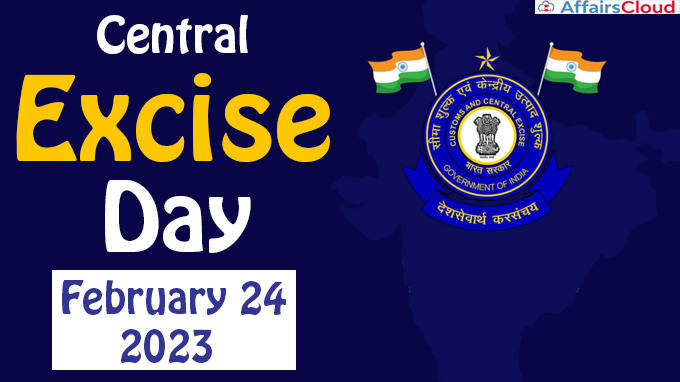
The Central Excise Day is annually observed across India on 24th February to recognise and acknowledge the efforts and contributions of the Central Board of Indirect Taxes and Customs (CBIC) towards the development of India.
The day also marks the anniversary of the enactment of the Central Excise and Salt Act on 24th February 1944.
- The annual events and celebrations as a part of Central Excise Day are organised by the CBIC.
Objective of Central Excise Day:
To encourage the CBIC department employees to carry out the duties of central excise across India in a better way in order to prevent corruption in the goods manufacturing business.
What is Central Excise?
Central excise duty is an indirect tax that is levied by the Central Government of India for the production, sale, or license of certain goods.
Everyone, rich or poor, is liable to pay tax indirectly on the purchase of goods which have already been charged to duty.
- This tax is administered under the authority of Entry 84 of the Union List of the Seventh Schedule read with Article 226 of the Constitution of India.
Central Excise and Salt Act:
Central Excise and Salt Act of 1944 was the first law to impose excise duties on goods manufactured or produced in India.
- The act was passed consolidating the various enactments on the subject and imposing new duties on coffee, tea and betel nuts.
- In 1966, the act was renamed as The Central Excise Act 1944 and the Schedule 1 and 2 of the act were related to the values and rates of the duties.
About CBIC:
Central Board of Indirect Taxes and Customs (erstwhile Central Board of Excise & Customs) is a part of the Department of Revenue under the Ministry of Finance.
- The Board is the administrative authority for its subordinate organizations, including Custom Houses, Central Excise and Central GST Commissionerates and the Central Revenues Control Laboratory.
Key Points:
The observance of Central Excise Day means to collect tax on the goods & by the people earning over the limit which has been decided according to the terms of the Central Excise Act 1944.
The tax payable rate has been set under Schedule I and II according to the Central Excise Tariff Act in the year 1985.
There are 2 types of processes carried out by the Central Excise department to put into effect all the laws and collections of the central excise:
Physical Control Process: Implemented in order to manage the central excise duty for cigarettes only.
- In this process first of all an evaluation is done under the custody of Central Excise officers for the approval purpose.
Self Removal Process: Implemented in order to manage the central excise duty for all other goods getting manufactured all through India.
- In this process all the legal responsibilities on the goods are self-accessed by the manufacturers in order to clear the goods.
About Central Board of Indirect Taxes and Customs(CBIC):
Chairman– Vivek Johri
Headquarters– New Delhi, Delhi
Motto– “Desh Sevarth Kar Sanchay” Tax collection in Service of the Nation




